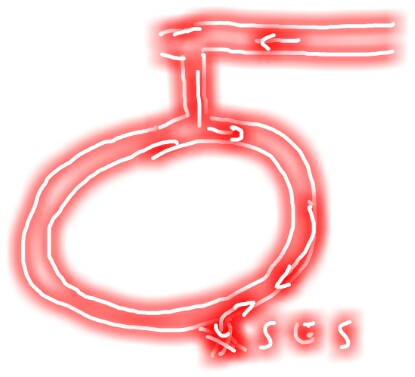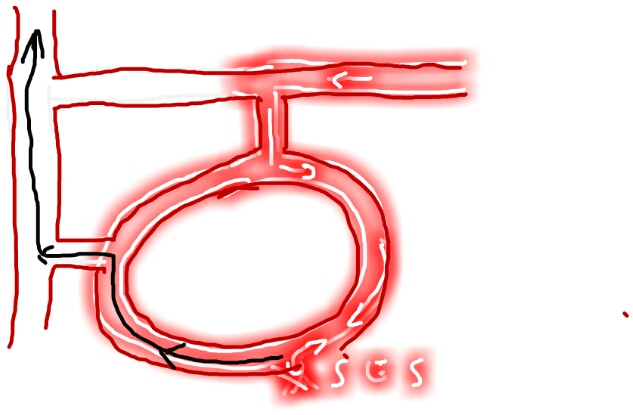Neo-Advaita picked up this teaching from traditional Vedanta. It is called neti neti, not this, not that. Bascially, all that Neo-Advaita has is neti neti, but it is not actually properly understood by the teachers. Negating the mind can take you quite a way, but it cannot close the deal because the denial of the apparent reality is not tantamount to the hard and fast realization “I am limitless non-dual ordinary actionless awareness.” And the removal of the apparent is not accomplished by BELIEVING in this teaching, by mindless denial. It only comes about by intense self inquiry, applying inquiry to everything that happens in you on a moment to moment basis.
This apparent reality teaching is quite sophisticated and I cannot do it justice here. James Swartz Interview in non-dualitymagazine (capital letters added)
Monthly Archives: August 2014
Translating Vedantic terms to Western seekers – Faith, God, Sin
![]() The following is blog I posted in 2011 when I was a blogger of Advaita Academy. As all of the addressed terms concern our topic of the month “belief” I am publishing it here again (with small alterations):
The following is blog I posted in 2011 when I was a blogger of Advaita Academy. As all of the addressed terms concern our topic of the month “belief” I am publishing it here again (with small alterations):
Faith
The word faith carries two meanings: trust and belief.
When I trust in something I meet it with confidence; even without knowing its exact nature, I assume that it will not harm me, rather that it will be beneficial to me when I expose myself to it.
When I believe in something I meet it with a conviction to be existent; I also may not know its exact nature but there is not necessarily an assumption involved that it will be beneficial to me.
Trust invites devotion – devote what? Time, energy, other resources. Devotion to what? To something assumed to be benevolent.
Belief demands submission – submit what? Any convictions, insights, reasoning or intuitions that contradict the belief. Submission to what? To something assumed to exist.
Shraddha is one of the nine virtues that should be cultivated by an aspirant to Advaita Vedanta, i.e. shraddha is considered to be one of the most essential traits someone should own when embarking on the journey to discover his/her own true Self. Usually shraddha is translated as “faith”.
Now, in the context of Advaita Vedanta it seems to be crucial that shraddha as faith is explained, understood and associated with trust and devotion, not with belief and submission of one’s own reasoning capacities. This is especially important when addressing Western seekers.
Why?
Belief – a dangerous thing
 Belief can be a dangerous thing, as Galileo discovered to his dismay early in the 17th century, when he was denounced to the Inquisition because of his claim that the earth went around the sun and not vice versa. Unfortunately for him, the Catholic Church was committed to the opposite belief so he never stood a chance. Nowadays, of course, we know better and happily acknowledge that Galileo was correct, despite the fact that everyone still talks about sunrise and sunset!
Belief can be a dangerous thing, as Galileo discovered to his dismay early in the 17th century, when he was denounced to the Inquisition because of his claim that the earth went around the sun and not vice versa. Unfortunately for him, the Catholic Church was committed to the opposite belief so he never stood a chance. Nowadays, of course, we know better and happily acknowledge that Galileo was correct, despite the fact that everyone still talks about sunrise and sunset!
(Incidentally, this is a frequently encountered metaphor for the change that occurs upon self-realization. Just as we recognize the truth of heliocentricity, yet still talk as if the Sun revolved around the Earth, so the realized man still acts as though he lives in a dualistic world, even though he now knows that everything is Brahman.)
Belief is so often treated by the believer as if it were true knowledge, instead of simply a strongly (and often wrongly!) held opinion. We really ought to know better, given the history of such mistaken, scientific views as the theories of phlogiston and ether. If the most brilliant scientists can be wrong, so can we! Continue reading
Q. 362 – Knowledge and Belief
Q: What does it take to become God-realized? Is it simply to accept that I am brahman,or to really believe I am brahman, or to really, really believe I am brahman, etc? I understand that to have knowledge of something does not automatically transform me. I believe that in order to really know something one has to assimilate and implement the teaching. I know I am already That, but then, how can I ensure the attainment of mokSha in order to stop the illusion of saMsAra?
A (Dennis): Knowledge, according to Western philosophy (I think) occurs when you believe something and that belief is both justified (by experience and reason) and true. In order to become Self-realized (I don’t know what you mean by ‘God-realized), you have to subject the ideas of Advaita to doubt and questioning and repetition and consideration etc until such time as your beliefs become knowledge.
I had an experience about 25 years ago which provided me with a powerful illustration of how different knowledge is from belief. You will have to bear with me as it takes a little while (and two diagrams!) to explain.
 I used to attend philosophy lectures at a school called SES, which holds its talks in rented buildings scattered about the country. At this time, they were held in a house on a circular avenue as in the first image on the left. I always approached along the road at the top, turned left into the avenue and then clockwise to the school. On leaving, I always returned the same way – anti-clockwise, then right and right.
I used to attend philosophy lectures at a school called SES, which holds its talks in rented buildings scattered about the country. At this time, they were held in a house on a circular avenue as in the first image on the left. I always approached along the road at the top, turned left into the avenue and then clockwise to the school. On leaving, I always returned the same way – anti-clockwise, then right and right.
Then, one night, for some reason, I carried on in the same, clockwise direction and then turned left, and then right at the main road as usual. Except that I suddenly hit some traffic lights that had not been there before and I realized that I was somewhere completely different! I quickly recognized where I was and took corrective action but I was completely mystified as to how I had got there.
I puzzled over this for some time, wondering if I had had some sort of mental blackout or been so involved in thinking about what we had been talking about that I hadn’t been paying attention and went the wrong way for some reason.
 And then, at some point, the explanation came to me and I knew beyond any doubt what must have happened, even though I had not looked at a map or spoken with anyone about it. The actual layout of the avenue had to be as shown in the second diagram. And so it was of course. But the point is that, when the answer came to me, it came as certainty, not as some working hypothesis or plausible explanation. (Apologies for poor quality of diagrams – I did them on my tablet using software I haven’t used before.)
And then, at some point, the explanation came to me and I knew beyond any doubt what must have happened, even though I had not looked at a map or spoken with anyone about it. The actual layout of the avenue had to be as shown in the second diagram. And so it was of course. But the point is that, when the answer came to me, it came as certainty, not as some working hypothesis or plausible explanation. (Apologies for poor quality of diagrams – I did them on my tablet using software I haven’t used before.)
So this is the certainty for which you are looking. It comes of itself when your mind is ready. You simply know that there is no other answer, even though you cannot look at a map to check your conclusion. If you have the belief already, you have presumably had sufficient shravaNa. You now need to give yourself more manana and nididhyAsana.
‘True belief’ vs. knowledge
It is interesting to compare the different accounts of ‘belief’ and ‘knowledge’ as coming from two traditions that are wide apart, as India and ancient Greece are; though it is known that there was a contact between the two at the time of Alexander the Great (cf. ‘The Questions of king Milinda’ – a debate between a Buddhist (Nagasena) and a Greek savant, namely, the king himself, Menander/Milinda).
‘True belief’ does sound rather awkward (and so it did to Plato’s – or Socrates’ – ears), or unusual, but, in my opinion, is close to shradda and shabda.
How deep is the difference between the two accounts?
*
(Shabda. One of the meanings of that term is ‘scriptural authority’.)
“According to Vedanta, implicit belief or faith (shradda) is the acceptance of, or the reliance on, the words of the trustworthy, which need no verification. It is other than credulity or gullibility. It is conviction of truth and tantamount to valid knowledge… Shabda as a source of valid knowledge means agama, authentic word that is free from all defects. It is a canon of knowledge recognized by most Indian systems of thought that the words of such persons as are free from delusion, error, deceit, and defects of the senses and the mind are a source of valid cognition. Thus, reason is implicit in faith. It is not unreasonable to rely on the reliable.” ‘Methods of Knowledge – According to Vedanta’, Swami Satprakashananda. Continue reading
Vedas – A body of knowledge or belief?
Vedas are primary/independent pramāṇa (means of knowledge) as regards the truth of oneself, for, all other means of knowledge are about the object, and not the subject. Holding it as such with an open-mind, pending discovery/assimilation of its revelation, is called śraddhā, loosely translated as belief.
A relevant xtract from Swami Paramarthananda lectures…
“We continue to accept the validity of the eyes inspite of occasional optical illusions. Similarly we have to accept the validity of the Veda, in-spite of certain seeming aberrations in certain portions of the Veda. If we reject the eyes because of occasional optical illusions, we are the losers. Similarly, if we reject the Veda because of certain seeming aberrations, we are the losers”.
A lovely Balance
Quote
Most people like to believe something is or is not true. Great scientists tolerate ambiguity very well. They believe the theory enough to go ahead; they doubt it enough to notice the errors and faults so they can step forward and create the new replacement theory. If you believe too much you’ll never notice the flaws; if you doubt too much you won’t get started. It requires a lovely balance.
Richard Hamming (American mathematician, 1915 – 1998) ‘You and Your Research’, Bell Communications Research Colloquium Seminar, 7 Mar 1986.
